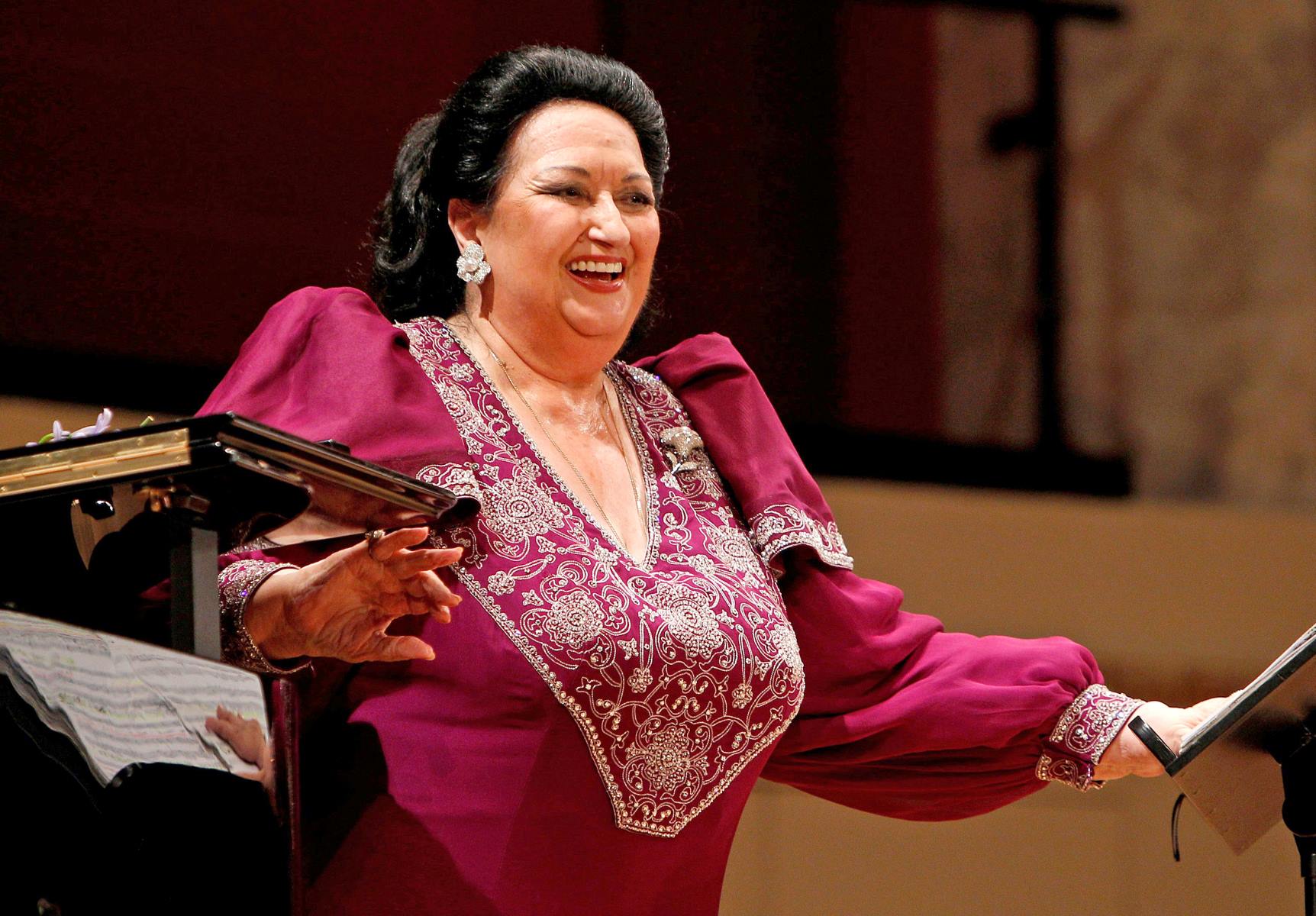
Montserrat Caballé was a renowned Spanish opera singer whose exceptional voice and powerful repertoire left a lasting impact on the world of music. Born on April 12, 1933, in Barcelona, Spain, Caballé rose to international fame with her extraordinary vocal range and versatility. With a career spanning over five decades, she captivated audiences with her enchanting performances and mesmerizing stage presence.
In this article, we will delve into the enigmatic life of Montserrat Caballé and uncover 22 intriguing facts about her journey to stardom. From her humble beginnings to her collaborations with renowned composers, Caballé’s talent transcended boundaries and earned her global acclaim. So, sit back and let’s explore the incredible world of this iconic soprano.
Key Takeaways:
- Montserrat Caballé, a renowned opera singer, had a remarkable vocal range of three octaves and collaborated with legendary tenor Luciano Pavarotti, leaving a lasting impact on the world of music.
- Caballé’s versatile repertoire, charitable work, and numerous accolades showcase her dedication and immense talent, leaving behind a legacy that continues to inspire and captivate audiences worldwide.
Montserrat Caballé was a world-renowned opera singer.
Known for her powerful soprano voice and outstanding vocal range, Montserrat Caballé captivated audiences across the globe with her mesmerizing performances.
She was born on April 12, 1933, in Barcelona, Spain.
Hailing from Catalonia, Caballé was proud of her Spanish heritage and often incorporated Spanish music into her repertoire.
Her breakthrough came in 1965 when she replaced Marilyn Horne in a production of Donizetti’s Lucrezia Borgia at Carnegie Hall in New York City.
This performance received rave reviews and marked the beginning of Caballé’s international success.
Caballé had a remarkable vocal range of three octaves.
Her ability to effortlessly transition between registers allowed her to tackle a wide range of roles, from dramatic to coloratura soprano.
She collaborated with legendary tenor, Luciano Pavarotti, on numerous occasions.
Their duets, such as the iconic rendition of “Barcelona,” became instant classics and solidified their status as operatic powerhouses.
Montserrat Caballé performed at the wedding of King Juan Carlos I of Spain and Queen Sofia.
Her breathtaking rendition of “Barcelona” during the ceremony captured the hearts of millions around the world.
She was known for her interpretations of the works of composer Richard Strauss.
Caballé’s nuanced and emotionally charged performances of Strauss‘ operas, such as “Der Rosenkavalier” and “Salome,” were hailed as masterful.
Caballé frequently performed at leading opera houses, including La Scala in Milan and the Metropolitan Opera in New York.
Her captivating stage presence and powerful voice mesmerized audiences in some of the most prestigious venues worldwide.
Her recording of “The Three Queens” with fellow soprano Joan Sutherland and mezzo-soprano Marilyn Horne is considered a masterpiece.
The collaboration showcased the extraordinary vocal talents of these three extraordinary women.
She was awarded the National Prize for Music in Spain in 1982.
Montserrat Caballé’s contributions to the world of music were recognized with this prestigious honor.
Caballé was known for her charitable work.
She dedicated her time and talent to various causes, including The Josep Carreras International Leukemia Foundation.
Montserrat Caballé received the UNESCO International Music Prize in 1995.
This esteemed award acknowledged her significant contributions to the enrichment of music and cultural heritage.
She performed alongside Freddie Mercury on the hit single “Barcelona.”
The collaboration between the operatic powerhouse and the rock legend created a unique and memorable musical fusion.
Caballé was known for her versatile vocal abilities.
From the delicate coloratura passages to the soaring high notes, her voice possessed a rich and expressive quality.
She received numerous accolades throughout her career, including the Grammy Lifetime Achievement Award in 2011.
This prestigious award recognized her profound impact on the world of music.
Montserrat Caballé performed in various languages, including Italian, French, German, and Russian.
Her linguistic versatility allowed her to bring authenticity to a wide range of repertoire.
She collaborated with renowned conductors, such as Herbert von Karajan and Sir Georg Solti.
Caballé’s musicality and interpretive skills were highly esteemed by these maestros.
Caballé possessed a warm and friendly personality offstage.
She was beloved by her colleagues and renowned for her generosity and kindness.
Montserrat Caballé’s voice can be heard in numerous film soundtracks.
Her powerful yet emotive voice enhanced the cinematic experience in films such as “Zeffirelli’s Otello” and “Kundun.”
She received an honorary doctorate from the University of Barcelona in 2007.
This recognition highlighted her profound influence as an artist and her commitment to musical excellence.
Caballé’s career spanned over five decades.
From her early performances as a young soprano to her acclaimed later years, she remained a strong presence in the world of opera.
Montserrat Caballé passed away on October 6, 2018, but her legacy lives on through her timeless recordings and unforgettable performances.
Her extraordinary talent continues to inspire and captivate audiences around the world.
Montserrat Caballé was truly a musical icon, and her contributions to the world of opera will forever be remembered. Through her powerful voice and emotive performances, she touched the hearts of millions. Her versatile repertoire, charitable work, and numerous accolades showcase her dedication and immense talent. Montserrat Caballé’s unique collaborations with artists from different genres demonstrated her ability to transcend boundaries and captivate audiences worldwide. Although she may no longer be with us, her legacy lives on, reminding us of the lasting impact she made in the world of music.
Conclusion
Montserrat Caballé was undeniably one of the most iconic and enigmatic figures in the world of opera. Her remarkable vocal range, expansive repertoire, and exquisite technique paved the way for her to become a global sensation. Throughout her illustrious career, Caballé enchanted audiences with her captivating performances and touched the hearts of millions with her powerful and emotive voice.
Beyond her musical accomplishments, Caballé’s warm and humble personality endeared her to fans and colleagues alike. Her genuine love for her craft and dedication to her artistry made her an inspiration for aspiring opera singers worldwide.
Montserrat Caballé’s legacy as one of the greatest sopranos of all time will continue to resonate for generations to come. Her contributions to the world of music will be cherished and celebrated, ensuring that her remarkable talent and indomitable spirit will never be forgotten.
FAQs
1. What were Montserrat Caballé’s most famous roles?
Montserrat Caballé was renowned for her performances in a wide range of roles, but some of her most famous portrayals include Norma in Bellini’s “Norma,” Violetta in Verdi’s “La Traviata,” and the title role in Bizet’s “Carmen.
2. How long was Montserrat Caballé’s career?
Caballé’s career spanned over five decades, from the 1950s to the early 2000s, during which she achieved unparalleled success and international acclaim.
3. Did Montserrat Caballé win any prestigious awards?
Yes, Caballé won numerous awards throughout her career, including the prestigious Grammy Award for Best Opera Recording in 1993 and the Prince of Asturias Award for the Arts in 2003.
4. What made Montserrat Caballé’s voice so unique?
Caballé possessed a rare vocal range and a distinctive tone that encompassed both power and purity. Her ability to effortlessly transition between delicate pianissimos and soaring fortissimos was one of the defining qualities of her voice.
5. Was Montserrat Caballé involved in any charitable work?
Yes, Caballé actively participated in various charitable initiatives throughout her life. She notably worked with organizations supporting children’s causes and was known for using her voice to raise funds and awareness for those in need.
6. Did Montserrat Caballé collaborate with other famous opera singers?
Absolutely. Caballé collaborated with numerous opera icons, including Plácido Domingo, José Carreras, Luciano Pavarotti, and many more, creating unforgettable performances and establishing herself as a legendary figure in the opera world.
Montserrat Caballé's enigmatic life and career continue to captivate opera enthusiasts worldwide. Dive deeper into the world of bel canto through Ann Patchett's surprising facts, or explore the rich history and beauty of classical music in our comprehensive guide. For those interested in the vocal range of sopranos, our article "32 Facts About The Sopranos" offers fascinating insights into this impressive voice type. Whether you're a seasoned opera aficionado or a curious newcomer, these articles promise to enrich your understanding and appreciation of the enchanting world of classical music and its most celebrated performers.
Was this page helpful?
Our commitment to delivering trustworthy and engaging content is at the heart of what we do. Each fact on our site is contributed by real users like you, bringing a wealth of diverse insights and information. To ensure the highest standards of accuracy and reliability, our dedicated editors meticulously review each submission. This process guarantees that the facts we share are not only fascinating but also credible. Trust in our commitment to quality and authenticity as you explore and learn with us.

